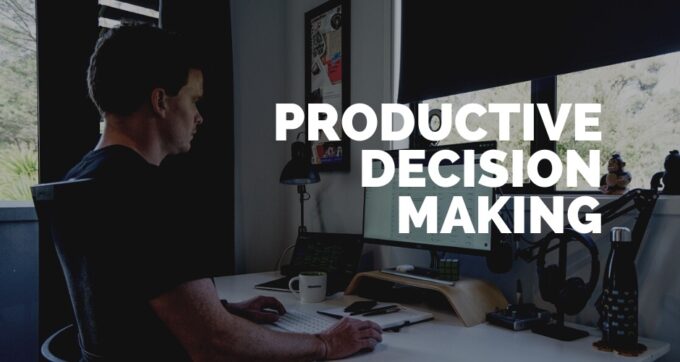We make thousands of decisions every single day from what to wear or what to eat for breakfast to how to respond to an email or what to work on next. And we should always be striving to make the best decision we can as efficiently as possible.
Don't want to read this post? Listen to the podcast:
I put a lot of my productivity down to not overthinking things. Generally, I make quick decisions and move on. Some decisions require more time. But in general, I like making quick decisions so my brain has less to remember and process. The more things I have in the “thinking about” basket, the greater my mental burden and the less brain power I have to focus on my work. This also means you have more mental capacity when something comes up that deserves a bit more thinking time.
When making a decision, here are some questions to consider to help you make quicker decisions:
- How permanent is this decision? – If you can make a decision that’s easy to undo or go back on later then you can more easily justify making a quick decision. For example, if you decide to read a book, you can easily put it down and move on to something else if you don’t enjoy it. But when deciding to get married, this is generally a permanent decision that you can’t easily undo later.
- How much impact will this decision have? – Don't sweat the small stuff. If a decision has low impact or importance, don’t spend long on it. I remember when we were planning our wedding, we made very quick decisions about things like the design of the invite and which flowers to use. The way we saw it, you could pick any number of invites or flowers and they’d all be pretty nice. The impact of the decision was very small. We spent more time thinking about the venue which had a much greater impact on logistics and our guests.
- How does this decision serve my goals? – Decisions that impact your goals (professional and personal) deserve more time. If you’re trying to build muscle or lose weight, you’re probably going to be very focused on your diet and will have to make careful decisions about what to eat. I’m not trying to do either, so as long as I’m eating healthily I don't mind what I eat. I’m a lot less picky.
- What are the opportunity costs related to this decision?– Decisions that have a greater opportunity cost deserve more time. For example, if you’re trying to decide whether to go to a conference, you should consider the opportunity cost of going (what else you could be working on) and not going (what you might miss out on by not attending). When you say ‘Yes’ to something, you’re saying ‘No’ to many other things. So be careful what you agree to.
- If in doubt, just say ‘No’ – When making a decision, if you’re on the fence or not sure which way to go, just say no. We’ve all been in that situation where we regret having agreed to do something. It’s better to say no and move on rather than half-heartedly doing something you regret later.
- ’Maybe’ is not a decision – When making a decision, your options are normally ‘Yes’ or ‘No’. ‘Maybe' is not a decision. Remove the word ‘maybe’ from your vocabulary. When you’re faced with a decision about an email, request or idea, give a simple yes or no answer. Follow your gut and do what you think is right.
Learning to get better and more efficient at making decisions will improve your focus and reduce the mental backlog of stuff to ‘think about'. Next time you find yourself pondering a decision, make it a goal to make a quick but informed decision so you can move on either way.
